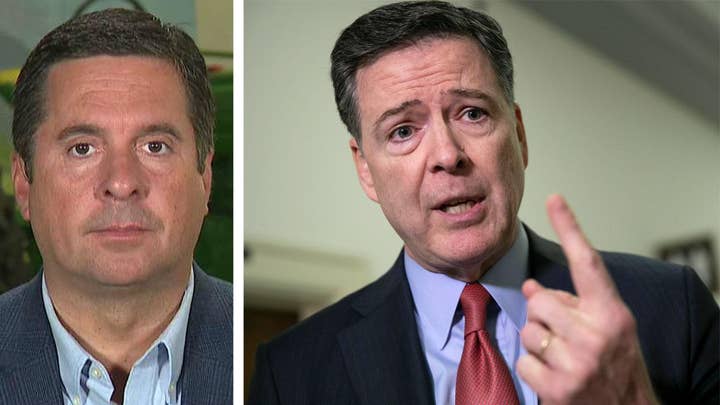Inspector general's report finds James Comey violated FBI rules, did not leak classified information
Justice Department watchdog says fired FBI Director James Comey mishandled Trump memos; chief intelligence correspondent Catherine Herridge reports from Washington.
James Comey immediately shared details from a post-election briefing for then-President-elect Donald Trump with the FBI’s Russia team, according to the recently released inspector general's report on the former bureau director’s actions -- in the latest indication that traditional transition briefings were used to update the incoming president and his team, as well as gather intelligence for the ongoing FBI investigation.
The long-awaited report from Inspector General Michael E. Horowitz on Thursday said Comey violated bureau policies by drafting, leaking and retaining his memos documenting private discussions with the president.
The report also revealed new details about the FBI director’s actions at that time, including how Comey and his top deputies went to great lengths to confront Trump at a Jan. 6, 2017 meeting at Trump Tower with the salacious and unverified accusations contained in the dossier, which had been funded by Democrats and drafted by British ex-spy Christopher Steele.
The goal of the briefing, according to witnesses who spoke to the inspector general, was to handle the subject matter sensitively -- to avoid any perception that the one-on-one briefing was an effort to hold information over the president-elect like a "Hoover-esque type of plot."
But, the IG report also found other motives by the FBI.
Witnesses told the inspector general they discussed the possibility that Trump "might make statements about or provide information of value to the pending Russia interference investigation" – a probe known as "Crossfire Hurricane."
CIA Director John Brennan, Director of National Intelligence James Clapper and National Security Agency Director Mike Rogers also were in attendance at the Trump Tower meeting -- which dealt in part with the Intelligence Community Assessment into Russia’s election interference in the 2016 campaign.
The group, according to the inspector general report, already knew that "several media outlets" had information about the unverified claims in the dossier "and were intending to publish it." The intelligence community directors agreed that the incoming president should be briefed and Clapper decided "the briefing should be done by Comey 'in a small group or one-on-one,'" the report said.
After Comey revealed the dossier claims to Trump, the report said, he observed the president's reactions and quickly documented them for investigative purposes in a record now known as Memo 1.
"Comey said he had a secure FBI laptop waiting for him in his FBI vehicle and that when he got into the vehicle, he was handed the laptop and ‘began typing [Memo 1] as the vehicle moved,'" the IG report stated.
REPUBLICANS PREDICT IG'S COMEY REBUKE IS TIP OF THE ICEBERG FOR FBI, DOJ OVER ANTI-TRUMP 'BIASES'
Comey later headed to the New York FBI field office to discuss the matter in a secure videoconference with other members of the Crossfire Hurricane team, according to the report.
Comey told the inspector general that he considered Memo 1 to be highly sensitive, with a classification akin to intelligence obtained through a court-authorized Foreign Intelligence Surveillance Act (FISA) warrant. Comey said it "ought to be treated...[like] FISA derived information or information in a [counterintelligence] investigation," where the standard classification is "SECRET."
A short time earlier, though, according to Memo 1, Comey had assured Trump "we were not investigating him." News that Trump had been briefed on the dossier accusations by top FBI brass was later leaked and provided the impetus for reporting on the dossier's existence.
Republicans expressed concern over the revelations.
"The evidence we have is that Comey wasn't going to brief the president just to get him up to speed,” California Rep. Devin Nunes, the ranking member of the House Intelligence Committee, said Tuesday on Fox News' "America's Newsroom."
Said Nunes: "He was acting as if he was an agent working for the Crossfire Hurricane team, so that is clear evidence that he was involved in this, whereas before, he tried to pretend that he's like a step or two away from what happened."
Earlier this year, a Fox News investigation revealed a similar episode, within days of the presidential election, unfolded involving incoming Vice President Mike Pence and another transition briefing.
Text messages between former FBI officials Peter Strzok and Lisa Page indicated they discussed using briefings to the Trump team after the 2016 election to identify people they could "develop for potential relationships," track lines of questioning and "assess" changes in "demeanor.”
The messages showed Strzok and Page debating staffing for an upcoming transition briefing and whether it would make sense to stay with the same agent or send a different one.
When the story broke in April, the vice president demanded further investigation into the possible infiltration of the transition team.
“I was deeply offended to learn that two disgraced FBI agents considered infiltrating our transition team by sending a counter intelligence agent to one of my very first intelligence briefings only 9 days after the election," Pence said in a statement. "This is an outrage and only underscores why we need to get to the bottom of how this investigation started in the first place."
Republicans in the Senate responded to those disclosures by seeking more information on the transition briefings as well as media leaks.
CLICK HERE TO GET THE FOX NEWS APP
"Were these efforts done to gain better communication between the respective parties, or were the briefings used as intelligence gathering operations?" Sens. Chuck Grassley, R-Iowa, and Ron Johnson, R-Wis., wrote in a joint letter in April. "Further, did any such surveillance activities continue beyond the inauguration, and in the event they did, were those activities subject to proper predication?"
Lawyers for Strzok and Page did not immediately respond to requests for comment when that story was published.
Fox News’ Gregory Re and Sandra Smith contributed to this report.























